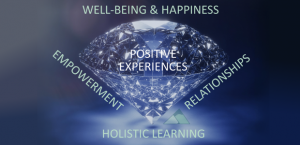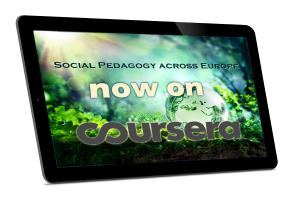Embedding social pedagogy
At ThemPra we have developed unique learning opportunities to enable professionals to make sense of social pedagogical concepts and values and successfully apply these in practice. We offer a combination of courses at varying intensity. Our SPPA-endorsed learning programmes are delivered both as standalone courses open to anyone and in-house as part of a whole systems change strategy. All our learning programmes aim to facilitate deep learning processes that lead to in-depth understanding and long-term retention of how the principles and concepts in social pedagogy can enrich practice.
Our online courses
Whilst our courses have had to move online during the pandemic, we’ve successfully retained the interactive, creative and experiential nature that makes learning such a powerful experience. You’ll find yourself much more fully engaged than you might expect, connect with people from across the UK and beyond, and we are able to support your learning journey over a regular and longer time frame. Below you can find out more about all our current courses:
Relational leadership (9 3-hr sessions)
 With its strong emphasis on more equal relationships, learning cultures, well-being and ethical purpose, social pedagogy has important implications for leadership across all levels of an organisation. Its concepts and principles not only apply to the people you support in practice but are equally relevant for how you work within your team and collaborate with other professionals. For the development of a social pedagogical culture within your service, it is vital that you and other leaders (such as senior managers, team leaders and other key people) know how to encourage teams to navigate complexity and make situated judgments that reflect your collective values and purpose. This intensive learning programme provides an excellent opportunity for you as a leader to explore how key principles in Social Pedagogy and Human Learning Systems translate into leadership, what this means for you, your team, the wider organisation and, most importantly, how relational leadership can benefit the individuals, families or groups supported by your organisation.
With its strong emphasis on more equal relationships, learning cultures, well-being and ethical purpose, social pedagogy has important implications for leadership across all levels of an organisation. Its concepts and principles not only apply to the people you support in practice but are equally relevant for how you work within your team and collaborate with other professionals. For the development of a social pedagogical culture within your service, it is vital that you and other leaders (such as senior managers, team leaders and other key people) know how to encourage teams to navigate complexity and make situated judgments that reflect your collective values and purpose. This intensive learning programme provides an excellent opportunity for you as a leader to explore how key principles in Social Pedagogy and Human Learning Systems translate into leadership, what this means for you, your team, the wider organisation and, most importantly, how relational leadership can benefit the individuals, families or groups supported by your organisation.
In facilitating the course, we will draw on a variety of learning methods that make relational leadership come to life – through experiential learning activities, group discussions, theoretical inputs, reflection and action planning on how you can develop your own leadership. Over the course of 9 3hr sessions, we will build a peer learning community in which participants increasingly take on greater responsibility for supporting each other in the ongoing process of applying your learning to your respective role as a leader in your specific practice context. Each 3hr session is designed to connect capability, motivation and opportunity by giving you time to explore an area of your practice that you’re determined to change, plan a micro-intervention – a small thing you’ll do to develop your relational leadership – and commit to your peers that you’ll come back the following session having tried this out.
Next course dates:
Starts January 2025. Please see here for further details and to register your interest.
Developing relationship-centred practice (6 3-hr sessions)
 The Diamond Model is one of the most powerful concepts in social pedagogy and fundamental to relationship-centred practice. Over the 6 3hr sessions, participants will be introduced to a number of tools to develop relational approaches in their practice when working within complex and challenging environments. Drawing on social pedagogical theory and principles around the Diamond Model areas of well-being & happiness, holistic learning, relationships, empowerment and positive experiences, this interactive course will focus on the central role of relationships within teams, organisations and working with individuals and families in the community. Our course will be highly relevant for individuals who seek to bring passion, compassion, integrity and creativity to strength-based practice.
The Diamond Model is one of the most powerful concepts in social pedagogy and fundamental to relationship-centred practice. Over the 6 3hr sessions, participants will be introduced to a number of tools to develop relational approaches in their practice when working within complex and challenging environments. Drawing on social pedagogical theory and principles around the Diamond Model areas of well-being & happiness, holistic learning, relationships, empowerment and positive experiences, this interactive course will focus on the central role of relationships within teams, organisations and working with individuals and families in the community. Our course will be highly relevant for individuals who seek to bring passion, compassion, integrity and creativity to strength-based practice.
We know that individuals accessing social care place the highest value on good relationships. The recent challenges of COVID-19 have reinforced the urgency of relationships and humanity in our work together and with the community. This timely course therefore seeks to build individual resilience and leadership through strengthening the role of relationships at a practice and organisational level as we move forward.
Next course dates:
Starts November 2024. Please see here for further details and to register.
Courageous conversations (6 3-hr sessions)
 What if we could find the courage to address the elephant in the room constructively? Better yet, what if we could have meaningful conversations about difficult issues in ways that improve the relationships between us? These are the questions at the heart of our new experiential online learning programme, tailored to the particular professional context of social care. We know how challenging it can be to have to deliver difficult messages to the people you support. We also know how beneficial it can be to create the conditions for meaningful dialogue with the people you support, so that you can have a courageous conversation. Through this learning programme we want to enable you to develop your skillset and experience the benefits of having courageous conversations within your organisation and with the people you support.
What if we could find the courage to address the elephant in the room constructively? Better yet, what if we could have meaningful conversations about difficult issues in ways that improve the relationships between us? These are the questions at the heart of our new experiential online learning programme, tailored to the particular professional context of social care. We know how challenging it can be to have to deliver difficult messages to the people you support. We also know how beneficial it can be to create the conditions for meaningful dialogue with the people you support, so that you can have a courageous conversation. Through this learning programme we want to enable you to develop your skillset and experience the benefits of having courageous conversations within your organisation and with the people you support.
Learning requires a leap of faith into the unknown, the courage to try things out, and the support of people who share the learning journey. We have therefore designed this learning programme to draw on the power of peer learning, combined with insights from communication theory, conflict resolution methods, space for self-reflection and action planning. Over the course of 6 3hr sessions, we will build a peer learning community in which participants increasingly take on greater responsibility for supporting each other in the ongoing process of applying your learning to your respective practice context. Each 3-hr session is designed to connect capability, motivation and opportunity by giving you time to explore an area of your practice that you’re determined to change, plan a micro-intervention – a small thing you’ll do to communicate more constructively – and commit to your peers that you’ll come back the following session having tried this out.
Next course dates:
Early 2025 – dates TBC. Please see here for further details and to register your interest.
Making Co-Production Meaningful (5 3-hr sessions)
 There is growing recognition that children, young people, adults and their families are often not meaningfully included in making impactful decisions on the types of care and welfare services they receive or are being set up in their local communities. As Social Care Futures state, the impact of this ‘has meant that what is important to people themselves has not been directly communicated, and decisions are driven by experts other than those with lived experience’. Set against the findings of a number of recent independent care reviews of both children’s and adult social care, the importance of working in partnership to co-create and co-produce positive change has come into sharper focus. With limited resources, it is important that welfare services are delivering support that is meaningful to individuals, families, communities and wider society as a whole. As Hilary Cottam sets out in Radical Help, it’s time for a bold new approach to the welfare state which is based on a common purpose and helps people to flourish.
There is growing recognition that children, young people, adults and their families are often not meaningfully included in making impactful decisions on the types of care and welfare services they receive or are being set up in their local communities. As Social Care Futures state, the impact of this ‘has meant that what is important to people themselves has not been directly communicated, and decisions are driven by experts other than those with lived experience’. Set against the findings of a number of recent independent care reviews of both children’s and adult social care, the importance of working in partnership to co-create and co-produce positive change has come into sharper focus. With limited resources, it is important that welfare services are delivering support that is meaningful to individuals, families, communities and wider society as a whole. As Hilary Cottam sets out in Radical Help, it’s time for a bold new approach to the welfare state which is based on a common purpose and helps people to flourish.
This intensive learning programme provides an excellent opportunity for you as a practitioner at any level to explore how key principles in social pedagogy and Human Learning Systems translate into working to co-produce effective change, what this means for you, your team, the wider organisation and most importantly, how co-production can benefit the individuals, families or groups supported by your organisation. In facilitating the course, we will draw on a variety of learning methods that make co-production, collaboration and participation come to life – through a combination of experiential learning activities, group discussions, theoretical inputs, reflection and action planning on how you can develop your own practice. You’ll thus gain a first-hand insight into how you can create an inclusive setting and collaborate meaningfully.
Next course dates:
Starts September 2024. Please see here for further details and to register.
Social Pedagogy across Europe (MOOC)
 We recently launched a Massive Open Online Course in Social Pedagogy across Europe as part of our Erasmus+ funded partnership project led by us in partnership with the University of Central Lancashire (UK), UCC Copenhagen (Denmark), Common View (Denmark), Universitat Autònoma de Barcelona (Spain), Ghent University (Belgium), Masaryk University (Czech Republic), and KJSH Verbund für Kinder-, Jugend- und Soziale Hilfen (Germany) (see here for details). This MOOC offers a unique resource for anyone who would like to develop a greater understanding of social pedagogy. You can undertake the MOOC at your own pace and in your own time, with all learning resources available entirely free of charge. You have the option to pay a small charge for certification of the course if you wish to do so and will be able to use this for their CPD.
We recently launched a Massive Open Online Course in Social Pedagogy across Europe as part of our Erasmus+ funded partnership project led by us in partnership with the University of Central Lancashire (UK), UCC Copenhagen (Denmark), Common View (Denmark), Universitat Autònoma de Barcelona (Spain), Ghent University (Belgium), Masaryk University (Czech Republic), and KJSH Verbund für Kinder-, Jugend- und Soziale Hilfen (Germany) (see here for details). This MOOC offers a unique resource for anyone who would like to develop a greater understanding of social pedagogy. You can undertake the MOOC at your own pace and in your own time, with all learning resources available entirely free of charge. You have the option to pay a small charge for certification of the course if you wish to do so and will be able to use this for their CPD.
Next course dates:
Face-to-face courses
In our face-to-face courses we use experiential learning activities and reflective methods to provide participants with a holistic insight into social pedagogy and to strengthen relationships between participants. This also enables you to develop a strong sense of ownership for integrating social pedagogy into your organisational practice, culture and structures. Please find out more about our options below:
Social pedagogy core course (9 days)
This unique social pedagogy course is a highly effective, in-depth course. It conveys social pedagogical concepts and principles in ways that are both meaningful and relevant to participants’ practice. The course is therefore designed holistically to enable experiential learning, support individual and group reflection processes and to create dialogue by drawing on participants’ knowledge and experience. Over the 9 days participants explore the historical and philosophical roots of social pedagogy in continental Europe and how these have shaped social pedagogues’ concepts of children as ‘rich’ in potential. Connecting theory, ethics and practice, the course places particular emphasis on enhancing well-being and happiness, creating holistic learning opportunities, developing authentic relationships and supporting empowerment. Through first-hand experience participants will also become familiar with a variety of methods they can easily transfer into their everyday-practice.
Trauma-informed practice from a social pedagogical perspective (4 days)
To further illustrate how carers and other professionals can use social pedagogy with children and adults who have experienced violence and trauma, this course looks at trauma from a social pedagogical perspective. It aims to enable practitioners to understand the impact of adverse childhood experiences on human development and how social pedagogy can make a difference. Emphasising the power of positive relationships, the course provides practice-relevant insights into how carers and other professionals can recognise and nurture everyday interactions as positive experiences that enrich people’s inner worlds and support both healing and well-being. The course can be delivered for up to 16 participants and uses similar experiential learning methods. If participants have not previously undertaken the Developing Relationship-Centred Practice course, we will expect them to undertake some advance reading and give them access to our MOOC so as to gain a basic understanding of social pedagogy.
Social pedagogical leadership course (3 days)
With its strong emphasis on more equal relationships, learning processes, a shared life-space and ethics as first practice, social pedagogy has important implications for leadership at every level of an organisation. This 3-day social pedagogical leadership course provides an opportunity for existing and potential leaders to explore in dialogue social pedagogical leadership, what this means for individuals, teams, and most importantly the impact leadership has on the staff and clients at the heart of services.
ThemPra Diamond course (3 days)
Our Diamond Model outlines the overarching aims and aspirations of social pedagogy and illustrates the role of social pedagogical practitioners to help children and young people discover their innate potential and resources. As an introductory course aiming to raise awareness and create further interest in social pedagogy, the 3-day Diamond course can be delivered for up to 16 participants, with course participants able to experientially engage with core social pedagogical concepts and to explore the relevance of social pedagogy for their practice. Following our Diamond Model, the course explores how practitioners can enhance children and adult’s well-being and happiness, create holistic learning opportunities and further strengthen their relationships in ways that empower children and adults.
Reflection in social pedagogy course (3 days)
Reflection plays a central role within social pedagogy. It enables professionals to continuously look for ways to further enhance their practice by relating theory to practice as well as drawing on their own experience and self-awareness in order to build stronger relationships with children, young people, other clients and colleagues. Reflection is therefore fundamental to any learning processes – at both an individual and collective level – as well as to long-term development within teams and organisations.
Over 3 days participants explore what makes reflection highly relevant to social pedagogical practice. The course focuses on how professionals can become more self-reflective and establish reflective processes within their teams in ways that are appreciative, inquisitive and constructive. Participants will also learn a range of practical methods that support reflection with children or other clients, in teams and as individuals.
Team development seminar (2 days)
In embedding social pedagogy in practice, a coherent understanding of social pedagogy within a team is essential. We offer 2-day team development seminars that support teams in exploring how they can use social pedagogy to develop their culture. In dialogue we can also explore specific practice aspects, such as communication, children’s participation, reflective practice, valuing diversity, creating a shared life-space, or relationship-building, to name but a few. By using experiential learning methods we ensure that all participants find ways to express their views and can share in an experience leading to a more holistic understanding of the issue and improved relationships within the team.
Social pedagogy agents course (2 days)
Developing change agents for social pedagogy is usually vital in the process of nurturing a social pedagogic culture. For professionals who have undertaken our 9-day course, we offer a top-up course to become a social pedagogy agent. The 2-day course focuses on reflecting with participants how they can continuously promote learning and reflection within their teams about how social pedagogical concepts and values can be translated into daily practice and structures within the organisation.
The course will prepare them to use their own initiative to develop their own practice, thinking and knowledge and that of their colleagues to effect sustainable change within their team.
Social pedagogy awareness seminar (1/2 to 1 day)
To ensure that professionals from across an organisation have a basic understanding of social pedagogy and an opportunity to explore its potential for their practice context, we offer introductory seminars of varying length. These often helps both an organisation and us to develop a clearer picture of the extent to which social pedagogy is reflective of existing practice and chimes with professionals. It can also reveal participants’ hopes and aspirations around social pedagogy and therefore what broader strategy seems to provide the best way to develop social pedagogy.
We are always actively developing new learning opportunities so feel free to get in touch with us with any inquiries or ideas.







